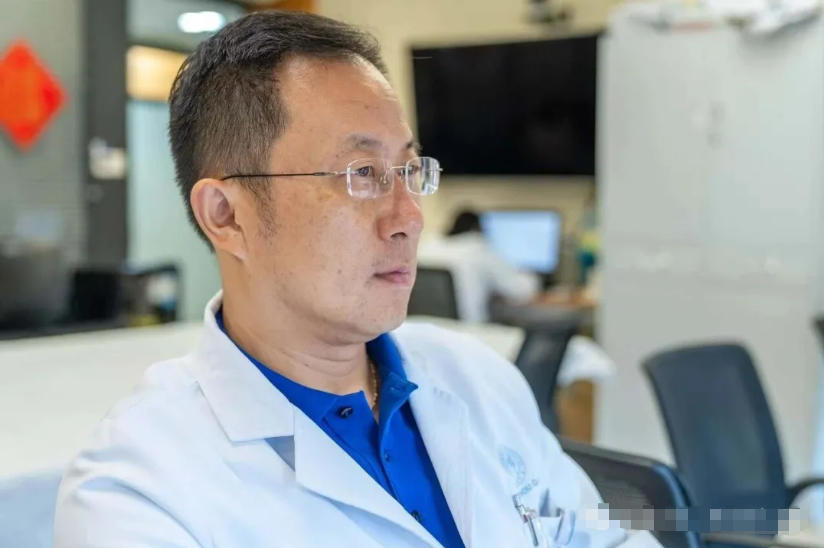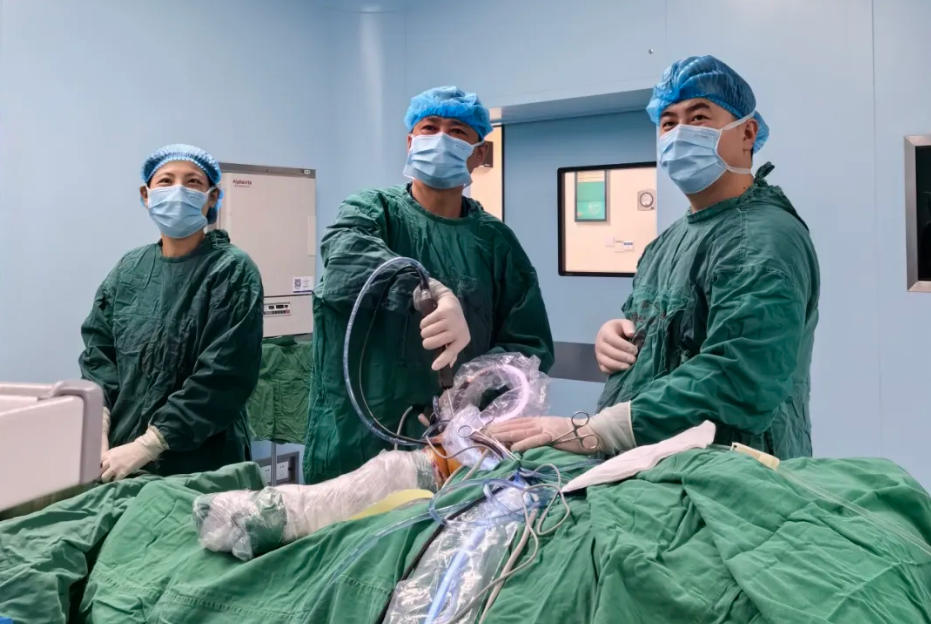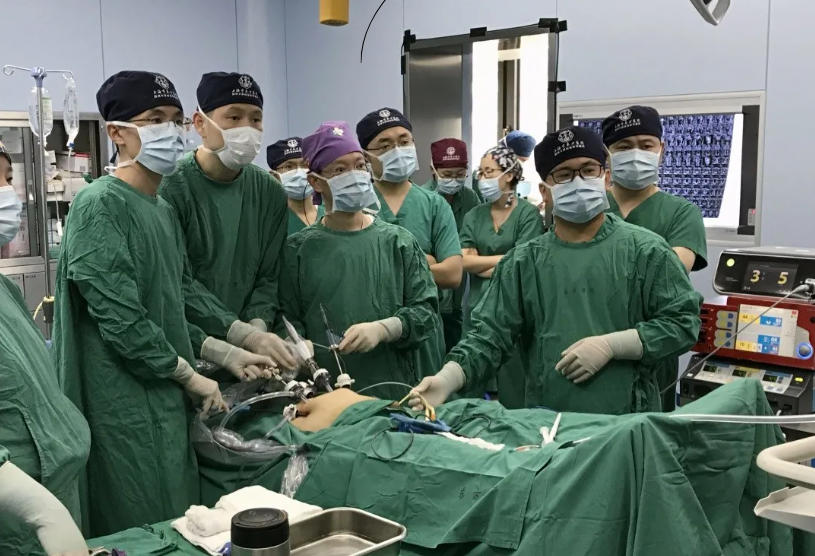Update time:2025-10-18Visits:3105

Hou Jian, Hematology, Professor, Director of the Department of Hematology at Renji Hospital
Introduction
Blood is the essence of life, where even a small change can affect the entire body. Hematologists are specialists who routinely confront severe conditions, complex diagnoses, and rapid patient deterioration. As a critical branch of medicine, hematology has evolved significantly. The relentless work of generations of hematologists and researchers has led to breakthroughs in understanding the mechanisms, diagnosis, and treatment of blood diseases, offering new hope and survival to patients.
When discussing contributions in this field, multiple myeloma cannot be ignored. Often called the “Voldemort” of hematology—a reference to the elusive and formidable villain from Harry Potter—it is notoriously difficult to diagnose early. Today, the incidence of multiple myeloma has surpassed leukemia, second only to lymphoma. “Facing this invisible killer, we need to precisely target the disease with standardized treatments while also pursuing innovative therapies,” says Dr. Hou Jian, current head of the Department of Hematology at Renji Hospital.
Dr. Kenneth Anderson, former president of the International Myeloma Society (IMS), has stated, “The tremendous progress in treating multiple myeloma patients worldwide should be attributed to continuous scientific research and innovative therapeutic methods.”
Indeed, the treatment landscape for multiple myeloma has been transformed in recent years, thanks to a deeper understanding of the disease’s biology and the development of targeted therapies. As research continues and new strategies emerge, there is growing hope for improving patient prognosis and quality of life.
For Dr. Hou Jian, each patient’s struggle and hope fuels his dedication to medical progress. He is not just a clinician but also a mentor, sharing his knowledge with students and peers, collectively safeguarding a beacon of hope for patients with blood disorders.
The Spark of a Vocation
“My decision to study medicine was shaped by the times. In junior high, my parents hoped I’d become a doctor or a military officer,” Dr. Hou recalls. But in that era, when social standing often dictated opportunity, attending college seemed an impossible dream. As society progressed, however, the national college entrance exam was reinstated, creating new opportunities. Dr. Hou was admitted to the Second Military Medical University with excellent marks, and his dream of becoming a military doctor began. His passion for medicine drove him to excel in his studies.
His connection to hematology began in university. A professor gave a detailed lecture on the work of Academician Zeng Yitao, a medical giant who had dedicated his career to studying hereditary blood diseases like thalassemia since the 1970s. Dr. Hou was captivated by the challenge and joy of such fundamental research.
“I have always preferred exploratory research into underlying mechanisms,” Dr. Hou explains. “If I were limited to treating surface symptoms or performing surgery, I would feel something was missing.” He believes that as medicine advances, basic research will become crucial for solving population health challenges, defining the future of the field.
For Dr. Hou, choosing hematology stemmed from a simple idea, a clear motivation, and consistent action.

Guidance from Giants
Soon after, Dr. Hou found another mentor who provided a platform for his growth. “My medical path has been influenced by many mentors. My master’s advisor, Professor Qian Shanghua, now over a hundred years old, had a profound impact on me. He often taught me to be ‘careful, focused, dedicated, and patient’—a mantra that is still deeply ingrained in me today.”
Professor Qian Shanghua is a renowned hematologist in China and a leading figure in the field. He was the founder and first director of the Department of Hematology at Shanghai Changzheng Hospital, making indispensable contributions to its development.
“I still remember following Professor Qian on his rounds, inquiring about patients’ medical histories, and discussing treatment plans in depth,” Dr. Hou recalls, his eyes lighting up. “Whenever a patient’s condition was mentioned, he would offer invaluable guidance. I cherished every learning opportunity.”
Dr. Hou’s doctoral advisor was Professor Kong Xiantao, a famous clinical immunologist in China and a pioneer in the diagnosis of plasma cell diseases. Under Professor Kong’s guidance, Dr. Hou was deeply influenced by his expertise and meticulous mentorship, which helped him define his research direction. “Whenever I faced difficulties in the lab, I would discuss them with Professor Kong,” Dr. Hou remembers. “He always offered insightful suggestions that guided my path and helped me refine my research to bring more hope to patients. I am forever grateful.”
Throughout his career, Dr. Hou has also learned from predecessors like Professor Wang Zhenyi from Ruijin Hospital, Professor Pan Ruipeng from Renji Hospital, and Professor Ouyang Rongren, whose support made him feel less alone on his journey.
Mentors can open the door, but you must walk through it yourself. Through decades of work at Changzheng Hospital, Dr. Hou grew into an expert and a backbone of the department, laying a solid foundation for its development. It was there he found his calling: tackling multiple myeloma (MM), a malignant tumor of plasma cells and a major global medical challenge. Dr. Hou, the military doctor, was ready to face it head-on.
Pioneering Research and Innovation
In 1993, Dr. Hou first proposed a groundbreaking biphasic hypothesis on the role of interleukin-6 (IL-6) in promoting multiple myeloma, attracting widespread academic attention. His theory suggested that both myeloma cells and stromal cells in the bone marrow microenvironment produce IL-6, creating a self-sustaining loop that drives cancer cell proliferation. This insight into the disease’s biology provided crucial clues for new treatment strategies.
In 1999, while attending a conference abroad, Dr. Hou learned that international colleagues were using thalidomide to treat multiple myeloma. After hearing a renowned oncologist speak on its potential, he was determined to bring this therapy to China. Upon returning, he discovered a domestic company produced the drug for leprosy. After confirming its potential, he became one of the first physicians in China to pioneer its use for myeloma, playing a key role in establishing this new treatment regimen in the country.
In 2002, Dr. Hou’s team successfully cultivated China’s first myeloma cell line, CZ-1, providing a vital tool for research. The achievement, born from countless experiments, was a moment of immense joy and solidified his dedication to scientific discovery. His subsequent breakthroughs include identifying the therapeutic potential of the synthetic estrogen derivative 2-methoxyestradiol in 2005 and, in 2010, revealing the importance of chromosome 4q deletion in the pathogenesis of multiple myeloma.
Dr. Hou Jian is both a pioneer in myeloma research and a driving force in its clinical application. His work, widely recognized by the global medical community, has brought new hope to countless patients, embodying the powerful fusion of scientific discovery and compassionate care.
Carrying a Legacy, Fulfilling a Mission
“In 2017, I had the honor of leading the Department of Hematology at Renji Hospital, a role that comes with both glory and a profound sense of responsibility to its legacy,” Dr. Hou Jian states with determination.
The department, founded in 1956 by two pioneers in Chinese hematology, Professor Pan Ruipeng and Professor Ouyang Renrong, has a distinguished history. “Under our predecessors, the department achieved remarkable milestones, from using phase-contrast microscopes to perform high-dose chemotherapy and stem cell transplants. These innovations are part of our heritage, a legacy we must preserve and build upon,” Dr. Hou explains.
While honoring this foundation, Dr. Hou believes the department must actively expand its research, align with international frontiers, and continuously enhance its clinical and scientific capabilities. “Our future is guided by clinical needs,” he says. “We will deepen our research into the mechanisms of blood diseases, find more precise diagnostic and treatment methods, and strengthen basic research to identify new therapeutic targets. By fostering interdisciplinary collaboration, we aim to build a hematology research platform with global influence.”
Since 2017, under Dr. Hou’s leadership, the department has made significant strides in patient care, education, and research. It has secured major projects and funding, won numerous awards, and become a designated unit for the China Bone Marrow Bank and the Shanghai branch of the National Clinical Diagnosis and Treatment Research Center for Blood Diseases. The department was also granted membership in the European Society for Blood and Marrow Transplantation, enhancing its international profile.

Forging a Unique Identity
“For a medical discipline to develop sustainably, it must have its own specialization,” Dr. Hou asserts. “Without a unique focus, it’s difficult to stand out. Our department has concentrated on diseases like multiple myeloma, continuously exploring and accumulating expertise to build our distinct advantages.”
Dr. Hou’s team has been instrumental in securing the approval of new drugs in China and contributing to the global medical community. However, they face challenges, including public misunderstanding of clinical trials and the rigorous demands of protocol implementation. “Every step of a clinical trial requires the highest standards of precision and rigor, no matter the difficulties,” Dr. Hou emphasizes.
This dedication was recognized on September 21, 2019, when Dr. Hou received the “Most Influential Leader in Drug Clinical Research” award for his contributions to targeted therapies for hematological tumors. In his acceptance speech, he highlighted the crucial role of clinical research in translating medical progress into patient care and pledged to continue this work.
Dr. Hou is also a key figure in establishing treatment standards. He has contributed to numerous international and domestic guidelines and was the first Chinese expert to deliver a keynote speech at the International Myeloma Workshop, earning him the nickname “Mr. Myeloma of China” among his peers. In 2022, he was a primary drafter of China’s first guideline for relapsed multiple myeloma.
“We will continue to uphold Renji Hospital’s tradition of putting patients first,” Dr. Hou concludes, “providing personalized, precise care to give every patient hope and a new lease on life.”
He recalls a case of a woman in her forties who came to him with multiple myeloma. “After an in-depth conversation, I suggested an allogeneic hematopoietic stem cell transplant—an unconventional approach at the time. Twenty years later, she is not only alive but remains free of recurrence.” This breakthrough against scientific consensus gave the patient her life back, and she later became a grandmother.
The Power of Global Collaboration
Dr. Hou is a firm believer in international collaboration as a catalyst for progress in hematology. By sharing resources, including extensive patient data and cutting-edge technologies, the department can accelerate innovation. For him, true international partnership isn’t about following but about mutual exchange, learning, and leveraging complementary strengths.
“This shared progress broadens our horizons and gives us the resources to complement each other’s work,” he says. “Deepening international cooperation allows us to keep pace with global advancements and ultimately benefit more patients.”
Embracing Intelligent Medicine
The Department of Hematology is embracing the era of intelligent medicine, integrating artificial intelligence to improve diagnostic and treatment efficiency. Dr. Hou understands the critical role of interdisciplinary research. “Collaboration with fields like engineering and physics brings new problem-solving methods and accelerates innovation,” he notes.
His team was an early recipient of a key medical-engineering research fund from Shanghai Jiao Tong University, which they used to develop chip technology for detecting blood cancer genes. “Using this technology, we can now detect hundreds of genes at once, accelerating our research and solving blind spots left by older methods,” Dr. Hou explains.
In his view, translating research into practice is a systematic process. It involves identifying clinical problems, transforming them into scientific questions, finding solutions through research, and then applying those solutions back to the clinic. “A good clinical question becomes a research direction, and that’s where the longer journey begins,” he says.
A Global Patient, A Global Challenge
The department’s reputation has attracted patients from overseas. Recently, Dr. Hou’s team treated a patient from New Zealand who, after an 11-year battle with multiple myeloma, faced a severe relapse. His condition had deteriorated dramatically, with extramedullary plasmacytoma and complex chromosomal abnormalities indicating a poor prognosis.
Given the patient’s impaired hematopoietic function from prior treatments, Dr. Hou’s team opted for a novel approach: a combination of two CAR-T therapies (CD19 and BCMA). They collected the patient’s T cells, re-engineered them with a “navigation system” to target myeloma cells, and reinfused them. The CAR-T cells expanded massively, effectively eliminating the cancer. Over two years post-treatment, the patient’s indicators have returned to normal, with no signs of myeloma.
The courage and trust of this patient reinforced Dr. Hou’s belief that medical services have transcended borders.
The Ultimate Goal: A Cure
Despite these successes, Dr. Hou is not satisfied. “The essence of medicine is to cure,” he states. “The main challenge in treating hematological tumors remains achieving a radical cure and overcoming relapse. We need to understand the pathogenesis of these tumors, trace their cellular origins, and reveal why they recur.”
While targeted and immunotherapies have significantly extended patient survival, the problem of relapse persists. “Why does relapse occur? How can we overcome treatment resistance? These are the critical questions for the future,” Dr. Hou says.
He knows the road of research is difficult, but every breakthrough brings a new dawn for patients. For Dr. Hou and his team, the quest to unlock the mysteries of these diseases and sow the seeds of hope for the future is a journey without end.
Editor: Chen Qing @ ShanghaiDoctor.cn
If you'd like to contact Doctor Hou, please be free to let us know at chenqing@ShanghaiDoctor.cn.
Note: Chinese Sources from “The Path of Benevolent Medicine” which was published in 2024. It records 90 important medical figures in the history of Renji Hospital. Yewen Renyi (ShanghaiDoctor.cn) team was one of the major writers of the book and is authorized by Renji hospital to create English version on the website of ShanghaiDoctor.cn
Hospital: Renji Hospital, Shanghai Jiao Tong University School of Medicine
Dr. Zhou Qianjun | “Sculpting Life in the Chest” – A Portrait” – A Portrait
Dr. Cai Junfeng | Guarding Bone and Joint Health, Improving Quality of Life
Dr. Xu Xiaosheng|The Gentle Resilience of a Male Gynecologist
Dr. Shi Hongyu | A Cardiologist with Precision and Compassion
Dr. Zhang Guiyun|The Inspiring Path of a Lifesaving Physician
Dr. Chen Bin | Building the Future of ENT Surgery at Lingang,Shanghai
Prof. Zhang Baigen | The Oral History of China’s Vascular Surgery

Dr. Zhou Qianjun | “Sculpting Life in the Chest” – A Portrait” – A Portrait

Dr. Cai Junfeng | Guarding Bone and Joint Health, Improving Quality of Life

Dr. Cui Xingang | The Medical Dream of a Shanghai Urologist

Dr. Xu Xiaosheng|The Gentle Resilience of a Male Gynecologist

Dr. Shi Hongyu | A Cardiologist with Precision and Compassion

Dr. Zhang Guiyun|The Inspiring Path of a Lifesaving Physician

Dr. Jiang Hong | Bringing Hope to Vascular Frontiers

Dr. Huang Jia | A Journey of Healing "Breath"

Dr. Chen Bin | Building the Future of ENT Surgery at Lingang,Shanghai

Prof. Zhang Baigen | The Oral History of China’s Vascular Surgery